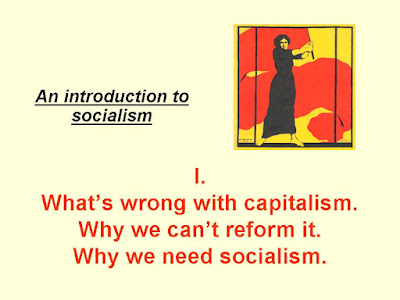[For a PDF of slideshow see here.]
1. What is capitalism?
- Private ownership of society’s means of production.
- Source of capitalist wealth is labor of working people, appropriated because capitalists own means of production.
- System driven by hunt for profit => ruthless competition and exploitation of working class. Profit is alpha and omega, the start and finish of whole thing. Everything else subordinated to this.
2. Social system responsible for all ills of society
- Exploitation of workers, insecurity, unemployment.
- Racism, ethnic and religious stereotyping and discrimination: profitable and politically necessary to keep oppressed divided, etc.
- Oppression of women: despite all, they remain second-class citizens.
- Through the family women bear the main burden of care of children, sick and elderly. If system had to pay for this, enormous cost to capitalists.
- Women paid less at work; big advantage to capitalists.
- Sexism divides workers.
- Homophobia: byproduct of support of family system, undermines it and must therefore be rejected. Also useful in dividing working class.
3. Imperialism & war
- Imperialism is highest stage of capitalism: outgrowth of giant monopolies and finance capital.
- War: nothing to do with dark side of human spirit and everything to do with imperialist drive for control of markets and sources of raw materials.
4. Gobal warming
Result of rapacity of capitalist system, of corporations’ drive for profit at all costs.
- Not due to population per se or ‘overconsumption’ but the way capitalism forces us to live.
- Consumerism: capitalism must foist ‘stuff’ on us, continually, otherwise economic crisis.
- This leads to crises of ‘overproduction’: too much stuff produced that can’t be sold. No other society knows such a crisis — people thrown out of work, into poverty, etc because too much is produced (madness).
5. A class-divided society
- Capitalist class is a small group: few percent of population (in Australia, a few thousand people).
- Working class: great majority of society — own no means of production (only petty personal property) and have to work for bosses in order to live. Carries society on its back. If workers stop working, society stops functioning.
- Middle classes: intermediate between capitalists and working class. Old middle classes: Small proprietors: self-employed (artisans, farmers). New middle classes: Professionals: self-employed (consultants, etc.).
6. How does 1% rule society?
- Ruling class has its supporters: upper middle class, bureaucrats, whole series of people on the make chasing big careers, backward workers, etc.
- Naked force not best option: big overheads and very expensive. Much better if can make people believe the system works.
- In Third World (the neocolonies of imperialism) force is a lot more naked (but still many variations).
- In West, huge resources devoted to ‘manufacturing consent’ (media, education) and obscuring class realities and fact that 1% rule society.
- Democracy: big advance over dictatorship (fascism etc) but severe limitations and if radical party ever looked like winning and using office to drive through an anti-capitalist program, the gloves would come off (see 1980s British TV film A Very British Coup).
7. What is the state?
If all else fails capitalists have the state — their ultimate fortress. Police, army, courts etc who are organised for violence and repression.
Unknown in early communist, ‘hunter-gather’ societies: there the whole community would organise its affairs, bear arms etc.
8. Can capitalism be reformed?
Short answer is NO! We struggle for reforms in the interests of the people but as long as the system remains these can only be provisional, the capitalists will never be reconciled to them.
- Look at the 8-hour day, first won a century ago: now disappearing for many. Overwork for one section; unemployment, underemployment, casualisation for another section.
- Welfare state: product of a specific period in West (post war boom plus Cold War), now being dismantled everywhere.
- War, climate change etc: no let up => we need a new system!
9. The socialist alternative
Socialism: means of production owned in common, no private owners — all are owners (collectively).
- Since economy is owned by society (nationally, state level, municipal), rational economic planning can be implemented. Combination of centralism and decentralisation.
- Provides basis for eliminating racism and discrimination, oppression of women, etc. Old attitudes might persist for a time but no longer being driven by interests of a specific social class.
10. Meeting people’s needs
- Under capitalism making profits for the rich is the overriding aim; all human needs subordinated to this. Housing, healthcare, education, the environment, etc — all suffer while funds are poured into corporate welfare and militarism.
- Under socialism the sole criterion is trying to meet the basic needs of the mass of people. It will be a society where ‘no one is abandoned’ (Fidel).
11. Objections to socialism
- It will never happen. (Leave that for next seminar!)
- Human nature: greed is innate, will always out => new ruling elite. A tired old, factually wrong mantra. Compare Soviet experience with Cuba.
- Will stifle individuality. That happens right now in class society, the individuality of the masses is crushed — ‘work, consume, die’.
- Economy won’t work if greed factor removed. Capitalist society only functions because so many ordinary people are not motivated by greed and egoism.
- Modern economy too complex to plan. Already the big capitalist corporations are really highly planned economies. The chaos is outside in the market.
12. Fight for socialism
- This is unknowable. But however grim things may look right now, the future is not written.
- What happens will be decided by the struggle.
- What each of us does makes a difference. As Trotsky once so powerfully expressed it: Each of us carries a particle of the fate of humanity on our shoulders. This consciousness should inspire us to do all we can to advance the cause.












